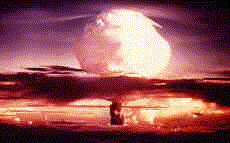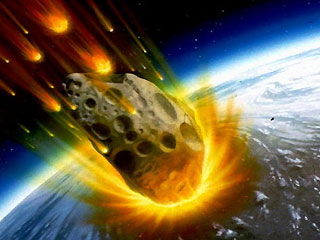We know how and when the universe, the solar system, the earth, life on earth and man began. What really interests us is what our end will be

We know how and when the universe, the solar system, the earth, life on earth and man began. What really interests us is what will be our end - not as an individual but as a species and this end may occur as a result of many events that physics knows how to point to. But these events are so distant in our concepts of time scales, that this should not worry us or our descendants in the coming generations.
the time line
And in order to know what time scales we are dealing with, we should note that the universe began about 15 billion years ago, the sun was formed about five billion years ago, the earth formed about 4.5 billion years ago, the beginning of life (at the level of viruses, bacteria, single-celled algae, etc. ) about four billion years ago, the beginning of the multicellular and more complex animals - about 550 million years ago, the extinction of the dinosaurs about 65 million years ago, the common ancestor of us and chimpanzees lived about six million years ago, the primitive human races existed about a million years ago, the beginning The intelligent man about 200 thousand years ago and the Neadrethal man existed alongside him until about thirty thousand years ago.
Catastrophes of one kind or another are familiar to us from many science fiction books and they are usually located in the not-so-distant future. We will describe here briefly and in order, the various endings from a scientific point of view, most of which will occur in the very distant future. It should be noted that the endings are mostly independent of each other, meaning that there will be more than one ending - an asteroid will hit us, after that the sun will burn the earth and in the end the entire universe will perish or collapse. We will be able to prevent holocausts that are exciting us, by emigrating to other places outside the earth - but that is another story.
asteroid

From time to time a large asteroid falls on Earth. Such a case could happen at any time - even within decades from today and this could cause a quite serious catastrophe - to the point of destroying most forms of life on earth. We will be able to identify such an asteroid that is approaching us and the closer it gets, the more we will be able to tell if it will just pass close to us, or if it will hit us. If we find that he is going to hurt us, we can prepare and blow him up while he is far away. It is therefore possible to breathe a sigh of relief in the meantime and be encouraged by the scenarios we have seen in a number of films that depicted such an event.
Self-destruction
The fossil record shows us that no species of mammal has existed on Earth for more than ten million years. But we, because of our developed self-consciousness and technology, are different from other animals, so we may be able to escape this fate. On the other hand, precisely because of technology, we may annihilate ourselves (environmental destruction, wars, nuclear holocaust...). One of the possible explanations for the fact that we do not meet aliens is that any technological civilization that reaches the stage we have reached, destroys itself in a short time - that is, before it even begins serious interplanetary journeys.
One can also think of the possibility that another species will develop to take our place, although this is unlikely according to our understanding of the laws of evolution.
The destruction of the human race as a result of local processes on Earth is not heartwarming; If and when such things happen - for future solutions.
Nemesis
Continuing the story of an asteroid strike that can happen at any time, we may and may be expecting an asteroid strike in about 26 million years.
In the investigation of the geological layers, it was found that once every 26 million years, a catastrophe strikes the earth, which destroys many of the life on earth. The most publicized was the extinction of the dinosaurs that happened 65 million years ago. A simple calculation will show us that we are now exactly in the middle of the cycle, which means that the next holocaust will occur in about 13 million years. Today it is known that the holocaust of the dinosaurs occurred as a result of a massive impact on the earth and the side effects of this impact. The hypothesis that explains the cycle of these injuries is called the Nemesis Hypothesis (see Asimov's book of this name). Nemesis - the mythological goddess of vengeance, is a supposed companion to our sun which together with it forms a double star system (like many of the other suns in the galaxy and universe). Since Nemesis is today at its maximum distance from us and is probably small and not bright, we cannot notice it or its effects. But when it approaches us, it disturbs from their tracks comets clustered in a cloud located somewhere far at the edge of the solar system and these are asteroids. One two or three of them hit the earth in a period of one million to two million years. The immediate effect of such a collision exceeds in strength all the means of destruction known to us and as a result the surface of the sun is also hidden for an extended period all over the world, with all the known phenomena of a nuclear winter. There is no doubt that culture and technology - if they exist then and if they remain on Earth - will be destroyed.
red giant
Our sun is now halfway through its life, but in 5 billion years, in the process of running out of nuclear fuel, its core will collapse and shrink, but its edges will swell. It will then become what is called in astronomy - a red giant. It will spread, burn and swallow all the planets near it, including the Earth. There is no need to expand on such a fiery hell, but it is likely that we will no longer be here anyway.
The end of the big bang
The universe is known to be expanding. The galaxies are moving away from each other; The question is until when. It depends on the amount of mass in the universe. Most of the mass in the universe is essentially dark mass consisting of gas clouds, black holes and other things that we cannot discern. If the total gravity of the mass in the universe does not overcome the expansion potential - the universe will continue to expand forever; If the mass is slightly large - the expansion of the universe slows down and then one day it will stop and begin to contract. The end of such a contraction is at a singular point before which all the mass of the universe will turn into particles and energy - the opposite of the big bang. Even the first option - expanding forever, does not bode well for the existence of life in the universe, if there will be any by then. All the stars will eventually become cold and dark and there won't be a single sun in the universe that can sustain life as we know it today. We do not know when one of these two possibilities will happen, for the same reason that we do not know which one will happen. In any case, it is many billions of years away.
The end of atoms
If our universe continues to exist in its current form, then according to a certain theory - in about ten to the power of 31 years, the nuclei of all the atoms in the universe will disintegrate and there will be no existence for matter. Just as certain elements have a time of existence, until they become another element (more precisely - a half-life), so also matter will cease to exist in the form of atoms and then of course there will be no matter, no stars and no life... but we really don't have to worry about that anymore because time This is more than a hundred billion billion times greater than the time the universe has existed so far.
What is the lesson we should learn from this? Does this mean that you can stop everything because everything will end anyway? It seems not. Each of us should continue with our actions and plans, but each of us should also do the most, so that our species will continue to exist at least in the next hundred, thousand, or ten thousand years.

2 תגובות
For me it can all be finished tomorrow, but I'm glad I read this article. Accurate and fun to read.
what is the end of the earth